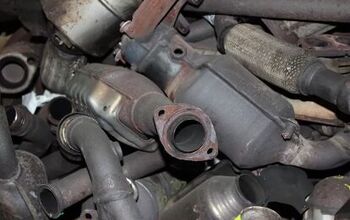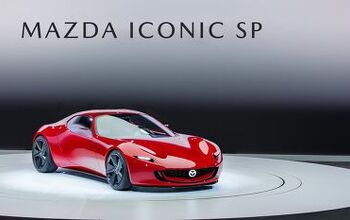Range Wars: GM Tweaks the 2020 Chevrolet Bolt for Greater Distance

Aside from Tesla fans and aficionados of various European exotics still stuck in development, the chief performance spec that concerns most electric vehicle buyers is not acceleration — it’s range. How many miles will this thing go before stranding me in the dark?
For most buyers on the lower end of things, getting maximum miles for your money is top of mind, and Chevrolet’s Bolt has offered an impressive EPA-rated range of 238 miles since it first rolled off lots in December 2016. Apparently, GM felt that wasn’t enough.
For the 2020 model year, the automaker stated Thursday, the Bolt will travel 259 miles on a charge. This newfound stamina further distances the Bolt from its lower-priced rivals; mainly, the Nissan Leaf Plus (226 miles) and the Tesla Model 3 Standard Range (220 miles) and Standard Range Plus (240 miles).
Hyundai’s new Kona Electric, which saw its first U.S. deliveries in February, boasts a range of — wait for it — 258 miles. Hmmm. Seems GM really wanted to wear a crown.
According to the automaker, the Bolt’s 10-percent range boost came about after Chevy’s battery engineering team “improved the energy of the cell electrodes by making small but impactful changes to the cell chemistry.”
“This innovative thinking allowed the team to implement the range increase without needing to change the physical battery pack and the way it is integrated into the vehicle structure,” GM stated.
While the otherwise unchanged model’s starting price remains at $37,495 for 2020, that doesn’t mean buyers won’t end up spending more. GM saw its $7,500 federal tax credit cut in half last April. Come October 1st, the credit shrinks to $1,875. Unless something happens at the legislative level, Bolt buyers can expect that credit to disappear on April 1st, 2020.
Bolt sales declined in 2018 as new rivals came on the scene; meanwhile, GM moved to boost supply in underserved regions. However, the recent demise of the plug-in Volt hybrid seems to have sent a gust of wind to the Bolt’s sails. Volume is up 5.4 percent over the first half of 2019, with the second quarter’s sales tally coming in 13.8 percent higher than that of the previous year.
[Image: General Motors]

More by Steph Willems
Latest Car Reviews
Read moreLatest Product Reviews
Read moreRecent Comments
- Theflyersfan Nissan could have the best auto lineup of any carmaker (they don't), but until they improve one major issue, the best cars out there won't matter. That is the dealership experience. Year after year in multiple customer service surveys from groups like JD Power and CR, Nissan frequency scrapes the bottom. Personally, I really like the never seen new Z, but after having several truly awful Nissan dealer experiences, my shadow will never darken a Nissan showroom. I'm painting with broad strokes here, but maybe it is so ingrained in their culture to try to take advantage of people who might not be savvy enough in the buying experience that they by default treat everyone like idiots and saps. All of this has to be frustrating to Nissan HQ as they are improving their lineup but their dealers drag them down.
- SPPPP I am actually a pretty big Alfa fan ... and that is why I hate this car.
- SCE to AUX They're spending billions on this venture, so I hope so.Investing during a lull in the EV market seems like a smart move - "buy low, sell high" and all that.Key for Honda will be achieving high efficiency in its EVs, something not everybody can do.
- ChristianWimmer It might be overpriced for most, but probably not for the affluent city-dwellers who these are targeted at - we have tons of them in Munich where I live so I “get it”. I just think these look so terribly cheap and weird from a design POV.
- NotMyCircusNotMyMonkeys so many people here fellating musks fat sack, or hodling the baggies for TSLA. which are you?


































Comments
Join the conversation
Range was never the Bolt's problem. The problem was the charging speed, which begins to throttle down at 55%, then gets slower.
Range wasn't the Bolt's problem. Even the just-okay fast-charging speed isn't a big problem, the better to protect the battery's long-term health. The problem was the front seats. I'm sure they worked fine in GM Korea's studio where much of the car's development was done. But for a Westerner broad of shoulders or belly, they're a deal-killer. (FWIW, I'm a small-boned dude, shaped more like a teenager than a middle-aged drone, and they sucked for me too.) The seatback bolsters are behind your back, not around it. Worse, there's literally a steel impact beam in the seat frame at your left hip and thigh where a cushion should be: if you're in the habit of sliding over into the seat rather than dropping down -- and sliding over is kinda your only option anyway given the Bolt's quasi-CUV seat height -- you will bruise yourself every damn time you get in or out. Maybe that's a contributing factor to the car's safety scores, which are bizarrely good for a small car made mostly of aluminum, but it is not endearing or conducive to sales. Someone always says "they've improved the seats this year/month/quarter" ... so periodically I give it a fresh sit at the dealer ... and every time I can't really feel an improvement. But maybe I'll try a mid-2019 just in case.